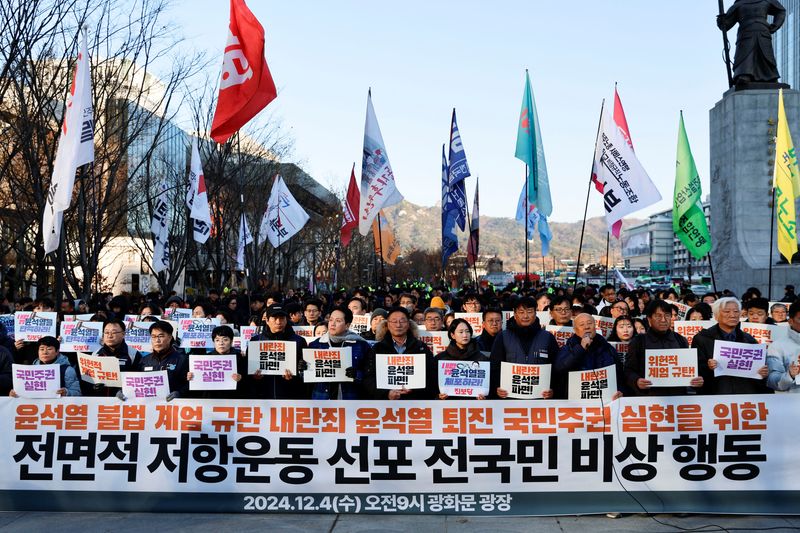
SEOUL (Reuters) -South Korean lawmakers submitted a bill on Wednesday to impeach President Yoon Suk Yeol after he declared martial law and reversed the move hours later, triggering a political crisis in Asia’s fourth-largest economy.
The surprise declaration of martial law in the major U.S. ally late on Tuesday caused a standoff with parliament, which rejected Yoon’s attempt to ban political activity and censor the media, as armed troops forced their way into the National Assembly building in Seoul.
The main opposition Democratic Party (DP) called for Yoon, who has been in office since 2022, to resign or face impeachment.
Six South Korean opposition parties later submitted a bill in parliament to impeach Yoon, with voting set for Friday or Saturday.
“We couldn’t ignore the illegal martial law,” DP lawmaker Kim Yong-min told reporters. “We can no longer let democracy collapse.”
There were deep divisions in Yoon’s ruling People Power Party as well, as its leader called for Defence Minister Kim Yong-hyun to be fired and the entire cabinet to resign. Kim has offered to resign, the defence ministry said.
Yoon told the nation in a television speech late on Tuesday that martial law was needed to defend the country from pro-North Korean anti-state forces, and protect the free constitutional order, although he cited no specific threats.
Chaotic scenes ensued as troops tried to seize control of the parliament building, although they stood back when parliamentary aides sprayed them with fire extinguishers while protesters scuffled with police outside.
The military said activities by parliament and political parties would be banned, and that media and publishers would be under the control of the martial law command.
But lawmakers defied the security cordon and within hours of the declaration, South Korea’s parliament, with 190 of its 300 members present, unanimously passed a motion for martial law be lifted, with 18 members of Yoon’s party present.
The president then rescinded the declaration of martial law, just about six hours after its proclamation.
Protesters outside the National Assembly shouted and clapped. “We won!” they chanted, and one demonstrator banged on a drum.
“There are opinions that it was too much to go to emergency martial law, and that we did not follow the procedures for emergency martial law, but it was done strictly within the constitutional framework,” a South Korean presidential official told Reuters by telephone.
There has been no reaction yet from North Korea to the drama in the South.
MARKETS VOLATILE
Despite the overnight drama, Seoul appeared normal on Wednesday, with the usual morning rush hour traffic in trains and on the streets.
However, more protests were expected with South Korea’s largest union coalition, the Korean Confederation of Trade Unions, planning to hold a rally in Seoul and vowing to strike until Yoon resigns.
The U.S. embassy urged citizens in South Korea to avoid areas where protests were taking place, while some major employers, including Naver Corp and LG Electronics Inc (KS:066570), advised employees to work from home.
Financial markets were volatile, with South Korean stocks falling about 1.3% and the won stable but close to a two-year low. Dealers reported suspected intervention by South Korean authorities to stem the won’s slide.
Finance Minister Choi Sang-mok and Bank of Korea Governor Rhee Chang-yong held emergency meetings overnight and the finance ministry promised to prop up markets if needed.
“We will inject unlimited liquidity into stocks, bonds, short-term money market as well as forex market for the time being until they are fully normalised,” the government said in a statement.
Sales of canned goods, instant noodles and bottled water had soared overnight, said a major South Korean convenience store chain, which sought anonymity.
“I’m deeply disturbed by this kind of situation, and I’m very concerned about the future of the country,” 39-year-old Seoul resident Kim Byeong-In told Reuters.
The National Assembly can impeach the president if more than two-thirds of lawmakers vote in favour. A trial by the constitutional court follows, which can confirm the motion with a vote by six of the nine justices.
Yoon’s party has 108 seats in the 300-member legislature.
‘DODGED A BULLET’
If Yoon resigned or was removed from office, Prime Minister Han Duck-soo would fill in as leader until a new election was held within 60 days.
“South Korea as a nation dodged a bullet, but President Yoon may have shot himself in the foot,” Danny Russel, vice president of the Asia Society Policy Institute think tank in the United States, said of the first martial law declaration in South Korea since 1980.
U.S. Secretary of State Antony Blinken said he welcomed Yoon’s decision to rescind the martial law declaration.
“We continue to expect political disagreements to be resolved peacefully and in accordance with the rule of law,” Blinken said in a statement.
South Korea hosts about 28,500 American troops as a legacy of the 1950-1953 Korean War.
Planned defence talks and a joint military exercise between the two allies were postponed amid the broader diplomatic fallout from the overnight turmoil.
South Korea’s political situation is an “internal matter” for the country, China’s Foreign Minister Wang Yi told reporters.
Sweden’s prime minister postponed a visit to South Korea, a spokesperson said, and Japan’s lawmaker group on Korean affairs cancelled a trip to Seoul set for mid-December.
NATO Secretary General Mark Rutte said the alliance was monitoring the current situation in South Korea, but added that its relationship with Seoul “was ironclad”.
Russia said it was following the “tragic” events in South Korea with concern.
Yoon, a career prosecutor, squeezed out a victory in the tightest presidential election in South Korean history in 2022, riding a wave of discontent over economic policy, scandals and gender wars.
But he has been unpopular, with his support ratings hovering at around 20% for months.
His People Power Party suffered a landslide defeat at a parliamentary election in April this year, failing to wrest control from opposition parties that captured nearly two-thirds of the seats.
There have been more than a dozen instances of martial law being declared since South Korea was established as a republic in 1948.
In 1980, a group of military officers forced then-President Choi Kyu-hah to proclaim martial law to crush calls for the restoration of democratic government.






